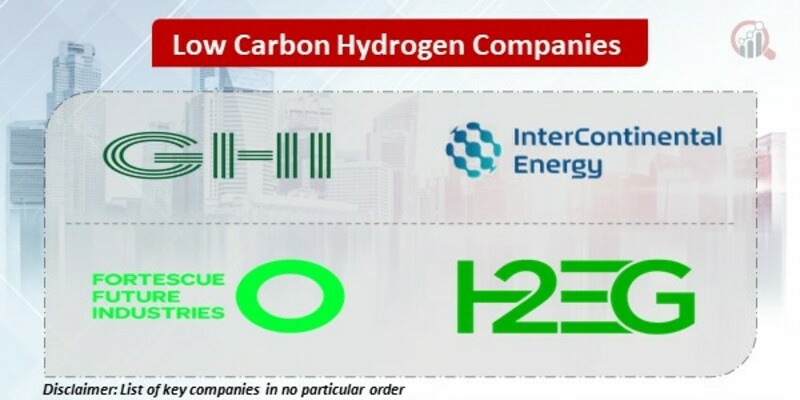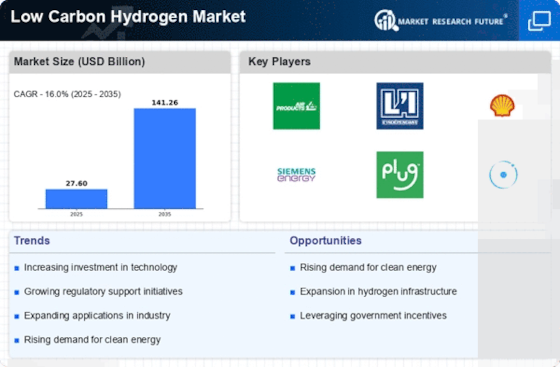Top Industry Leaders in the Low Carbon Hydrogen Market

The low-carbon hydrogen market is rapidly evolving, fueled by the global imperative to achieve net-zero emissions. This clean energy carrier presents a promising solution for decarbonizing hard-to-abate sectors like transportation, industry, and power generation.
Strategies Shaping the Game:
-
Diversification of Production Methods: Companies are investing in various low-carbon production technologies, including electrolysis powered by renewables, biomass gasification, and blue hydrogen with carbon capture and storage (CCS). This spread mitigates risks associated with specific technologies and caters to diverse market needs. -
Strategic Partnerships and Collaborations: Alliances with technology providers, energy suppliers, and research institutions are crucial. These partnerships foster knowledge sharing, accelerate technological advancements, and enable joint projects, ultimately propelling market growth. -
Market Share Positioning through Policy Alignment: Adapting to national and international policies promoting hydrogen development is key. Compliance with regulations and participation in subsidy programs enhance credibility and attract investors, strengthening market share. -
Innovation in Low-Carbon Technologies: Companies are pouring resources into R&D to improve efficiency, cost-effectiveness, and scalability of production technologies. This continuous innovation drives down costs and expands the market's reach.
Market Share Factors:
Several factors influence market share in this dynamic landscape:
-
Production technology: Leading the race are companies with efficient and cost-effective production methods, like electrolysis powered by renewable energy or advanced methane cracking with carbon capture and storage (CCS). -
Infrastructure development: Players actively building hydrogen pipelines, storage facilities, and distribution networks gain an edge. -
End-use applications: Companies catering to key application areas like green steel, hydrogen-powered vehicles, and clean fuel for aviation stand out. -
Technological innovation: Continuous efforts in areas like high-temperature electrolyzers, direct air capture, and hydrogen storage solutions attract investors and partnerships. -
Government policies and regulations: Supportive policies, including green hydrogen production subsidies, carbon pricing mechanisms, and hydrogen blending mandates, drive market growth and favor players aligned with these regulations.
Key Companies in the low-carbon hydrogen market include
-
Green Hydrogen International
-
Intercontinental Energy Corp
-
H2 Clean Energy
-
Fortescue Future Industries Pty Ltd
Recent Development
-
August 2023: Air Liquide and Siemens Energy announce a €2 billion project to build a 200MW electrolyzer plant in Germany, a significant step towards large-scale green hydrogen production. -
September 2023: The European Union unveils a €2.4 billion investment plan to accelerate the development of a European hydrogen economy, focusing on infrastructure, innovation, and market creation. -
October 2023: Japan launches a national hydrogen strategy, aiming to produce 3 million tons of clean hydrogen by 2030 and become a global leader in hydrogen technology. -
November 2023: The world's first green hydrogen-powered train is successfully tested in Germany, marking a significant advancement in sustainable rail transportation.










